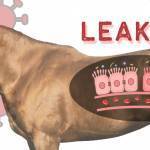Leaky Gut Syndrome in Horses

Leaky gut syndrome (LGS) is a generalized term that describes increased permeability of the gastrointestinal tract. The gastrointestinal tract is selectively permeable, meaning only certain molecules, such as nutrients, can be absorbed, and the luminal contents, including certain bacteria, are sequestered and prevented from being absorbed.
An epithelial lining of the gastrointestinal tract is made up of a single layer of cells that are held closely together by tight junctions. For a visual analogy, picture a row of bricks in a wall being held tightly together with mortar; if the mortar becomes excessively stressed or damaged, the wall’s strength becomes compromised. If the cellular junctions in the epithelial lining of the gastrointestinal tract become compromised, the permeability of the lining can increase, allowing fewer desirable molecules to be sent into the bloodstream when they otherwise would not be, hence “leaky gut syndrome.”
Leaky gut syndrome is not an official medical diagnosis in horses or humans so no validated test exists to diagnose it, according to Wendy Pearson, Ph.D., of the University of Guelph. Instead, according to her, LGS is often diagnosed based on the presence of risk factors, such as general inflammation, and when other factors have been ruled out. In addition, the prevalence of LGS in the broader horse population is unknown, and the occurrence of it in horses is currently understudied. However, information from other species suggests LGS can have negative physiological effects including impaired skeletal muscle and energy metabolism, reduced athletic performance, and chronic inflammation.
The causes of LGS are still being studied, but a few things are known. Stress, in various forms such as exercise, heat, and transport, can contribute to the dysfunction of the intestinal barrier.* Disruption of blood flow to the gastrointestinal tract can contribute to inflammation and the production of reactive oxygen species, such as in cases of an abdominal obstruction, shock, or trauma.* A transient increase in intestinal permeability occurs due to exercise and transport, but it is not known how much of this increase is normal or what the tipping point is, according to Pearson.
Of course, the question of how to support LGS from a nutritional standpoint is relevant, given that the gastrointestinal tract is responsible for absorbing nutrients. While there is no magic formula, there are a few hopeful possibilities. Pearson discussed butyrate, a short-chain fatty acid that is produced by bacteria in the microbiome. Butyrate is a preferred energy source for cells in the intestine and may even have some anti-inflammatory effects.**
The amino acid arginine, although not studied in horses, shows promise for improving the barrier function of the gastrointestinal tract, but too much arginine may potentially prevent other amino acids from being absorbed, so more information is needed. Another amino acid, glutamine, showed promise in healing the gut, but the study was conducted in vitro (outside the body, in a lab) and not in a whole horse with actual clinical disease. Pearson’s lab has investigated the use of a prebiotic—specifically, a fermentation product of Aspergillus oryzae—on stress-induced intestinal tract permeability in horses and found that did appear to eliminate excessive permeability in supplemented horses.+
Kathleen Crandell, Ph.D., a nutritionist with Kentucky Equine Research, commented, “Leaky gut syndrome is complex, and there is a lot we don’t know. However, supporting these horses with sound nutrition and veterinary care is critically important to promote healing.”
In terms of supplementation, Crandell recommends Total Wellness dietary supplement, which contains a triple blend of yeast and yeast cultures that boost nutrient absorption in horses. Total Wellness also includes vitamin E, a powerful antioxidant to support overall cellular health.
Would you like to know more about leaky gut syndrome in horses? Read a Q&A with Wendy Pearson, Ph.D., in the proceedings of the 27th Equine Health and Nutrition Conference, hosted by Kentucky Equine Research. Go to page 85.
*Stewart, A., S. Pratt-Phillips, and L. Gonzalez. 2017. Alterations in intestinal permeability: The role of the “leaky gut” in health and disease. Journal of Equine Veterinary Science 52:10-22.
**Andrade, M., R. Araújo, P. Vieira de Barros, A. Soares, F. Abrantes, S. Generoso, S. Fernandes, and V. Cardoso. 2015. The role of immunomodulators on intestinal barrier homeostasis in experimental models. Clinical Nutrition 34(6): 1080-1087.
+McGilloway, M., S. Manley, A. Aho, K. Heeringa, L. Whitacre, Y. Lou, E. Squires, and W. Pearson. 2023. Dietary fermentation product of Aspergillus oryzae prevents increases in gastrointestinal permeability (“leaky gut”) in horses undergoing combined transport and exercise. Animals 13(5):951.








